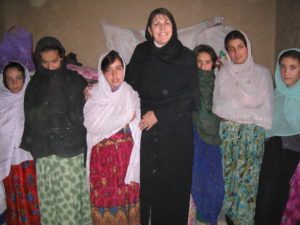Editor’s note: Last year’s chaotic withdrawal of U.S. forces from Afghanistan prompted these recollections by Wichitan Gail Goolsby. The Taliban, whose legacy Goolsby found so destructive in the mid 2000s, are again in control of the south Asia nation.
I never wanted to live outside the United States and particularly not a place like Afghanistan. I saw the photos from my husband’s 2002 and 2003 trips to this desperate place, and I thought, “This is no place for a woman, definitely not for me.”
But I found out there was an American private school opening, and because I’m an educator, I was overwhelmed by the chance to be part of such a great gift to a country where education had been diminished under the Taliban.
So in July 2005, my husband, Michael, and I moved to the war-torn country to open the International School of Kabul (ISK). We left behind our three young adult children and a network of family and friends.
A USAID grant in early 2005 funded the smaller original school, changing its trajectory to become a larger, college-prep, U.S.-accredited K-12 school. There were immediate needs upon arriving in country, like developing admissions policies for English Language Learners and remodeling the Kabul rented row of dilapidated homes to staff housing and classroom buildings.
ISK was ready in September 2005 to welcome 190 children of Afghan nationals as well as children of international families who had come to help rebuild the country. A good education was mandatory in restoring this nation, and as principal of ISK, I was determined to do my part to make it happen.
We quickly recognized that ISK could assist families who wanted to be together as the parents served Afghanistan. Without quality education, the children and perhaps mothers would be sent to another country.
One challenge was to help the Afghan families understand the differences between the American styles and standards of education and local schools. As an example, the Afghan schools placed more emphasis on end-of-year tests, while ISK stressed daily attendance, ongoing assignments, quizzes and projects as well as exams. The curriculum included a full balance of language arts, math, science, history, physical education and the fine arts, which were at first debated by Afghan parents. The Taliban had forbidden music and art and left families confused at the value of such instruction to student brain development and quality educational pedagogy.
ISK offered tuition incentives for female students, in direct contrast to the times of forbidden education for girls under the Taliban. Although both genders were welcome to public education after 2001, the opportunities remained limited and insecure, especially in the villages where fear and illiteracy abounded. The typical Afghan school lacked books, teachers, libraries, science labs and other essentials of learning. Teacher salaries in Afghanistan averaged only about $50 a month and drew from a pool of poorly educated professionals following decades of war and instability.
In 2008, ISK received full U.S. accreditation and recognition by the Afghan government. Afghan Minister of Education Hanif Atmar remarked that ISK was the most prestigious school in the country. Sadly, due to continued security issues, ISK closed its doors January 2015, not quite ten years after opening, leaving almost 400 students with few alternatives to quality education in Afghanistan.
Working and living in Afghanistan was difficult, especially for a woman. In a chaotic and impoverished city of four million, there were not enough resources to handle the large influx of returning war refugees. We lived with the ISK staff behind the walls of a heavily guarded, secure compound.
I never drove a car for seven years or went anywhere by myself off ISK campus. Sometimes, I had an armed guard along with my driver in an armored vehicle, depending where I was headed. Except in the privacy of my own apartment, I covered from wrist to ankle and always wore a cumbersome headscarf.
Occasional mortar blasts and threats of uprisings or terrorist activity such as vehicle bombs were a part of regular life. Daily inconveniences, such as low internet activity and loss of electricity for hours at a time, no central heat in bitter winter temperatures or air conditioning in summer desert heat, and constant dust, air pollution and homesickness became a new normal.
I felt like I had two lives for those years. Coming home to Missouri at Christmas and during summer breaks gave me wonderful reprieves from Kabul and time to connect with my children and friends but often made returning more painful. I usually booked my next flight home soon upon re-entering Afghanistan to give me that inspiration on tough days.
I began working through our Kabul years with counseling after we returned to Missouri in 2012. I self-published “Unveiled Truth: Lessons I Learned Leading the International School of Kabul” (available at gailgoolsby.com) in 2019 with the goal of showing people a side of Afghanistan and encouraging them to reflect on their own life lessons.
I ended the book with this challenge to readers: “When an opportunity comes along to help humankind, no matter how scary or crazy or dreadful you might think it is, take the time to consider if it might be your own Afghanistan — a hard time of trial that reaps you more rewards than you could possibly dream — and if it is, commit to it wholeheartedly, trusting that God will be beside you, helping you improve the world by, most importantly, helping you become a better you.”
Goolsby and her husband, a pastor, live in Wichita, where she’s a counselor, speaker and life coach. She can be reached at gail.goolsby@gmail.com













